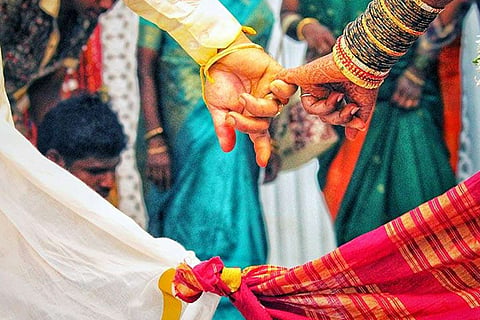

In August 2019, 23-year-old Sreelakshmi JS’s marriage to one Sanoop, was solemnised according to customary rites in Kerala’s Thrissur. The couple had then submitted an application for the registration of their marriage at the Local Registrar of Marriages (Common) in terms of the Kerala Registration of Marriages (Common) Rules, 2008. However, before the registration process was completed, Sanoop had to return to his work in South Africa earlier than planned.
Sreelakshmi wants to join her husband, but the incomplete marriage registration hindered her visa application process. So, she first filed a petition for wanting a marriage certificate in order to secure her visa and join her husband. She then filed another petition with the Kerala High Court seeking permission to allow the marriage registration through video conferencing and without insisting on Sanoop’s physical presence, reports LiveLaw.
The Court allowed the plea, directing an authorised representative of the husband, preferably one of his parents, to file an affidavit before the Local Registrar for Marriages. The court ruled that in his presence through video conferencing, the representative would sign in the marriage register on his behalf.
However, the court also ruled that the husband must appear physically before the registrar within one year and physically sign the marriage register himself. If he fails to do so, the Registrar has the liberty of revoking the marriage registration.
The respondents in the petition are the Kadukutty Grama Panchayath, the Secretary of the Panchayat, the Local Registrar of Marriages (Common) and the Registrar of Births and Deaths of the Panchayat.
According to LiveLaw, Justice P B Suresh Kumar relied on the precedent of Mathew T K v Secretary and Registrar of Marriages, Alappuzha and Another, 2020(4) KHC 456, which concerned a similar matter and was disposed of in a similar way as well.